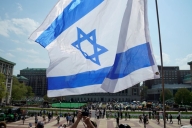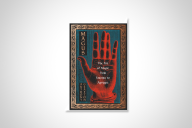You have /5 articles left.
Sign up for a free account or log in.
In an essay from the late 1960s, Umberto Eco wrote that day when revolutionaries could seize power by storming the central government offices of the old regime were over. The distribution of forces changed over the course of the 20th century. Taking control of the television stations had become at least as important -- possibly more so.
Reading this in the 1980s, I felt a certain skepticism. The Italian semiotician was responding, in part, to Marshall McLuhan, who made all sorts of gnomic and frequently silly pronouncements about the mass media; it appeared as if Eco were succumbing to the same impulse. A revolutionary strategist once defined the state as "bodies of armed men" -- and confronting those armed men, rather than the anchormen, still seemed to me like the decisive moment in any change of system or regime regime.
That passage has come to mind again over the past month – especially last Thursday, when the Egyptian government tried to derail the protests against Hosni Mubarak by shutting off access to the Internet. It amounts to a significant wrinkle in Eco’s argument. This time, it was the counterrevolutionaries seizing control of the media (not to use it, but to dissolve it). Likewise, the authorities in Tunisia responded to the popular uprising there by running a piece of code on the country’s servers to harvest the Facebook passwords of its citizens. It then tried to shut down their accounts.
The role of social networking and online communication in anti-authoritarian uprisings is a topic that gained special currency during the protests over the Iranian presidential election in June 2009. And the discussion often resonates with the familiar themes of what might be called the new digital populism: established authority shaking in its boots before the distributed power of the ‘netitizens. Watching American television coverage of the Egyptian events, in particular, one could be forgiven for supposing that new media sparked the uprising, since nothing in that country’s history over the past three decades is discussed as much as the arrival of Twitter and Facebook.
Considerably more thoughtful discussion has been taking place on academic blogs. Ulises Mejias, an assistant professor of new media at the State University of New York at Oswego, points out “how absurd it is to refer to events in Iran, Tunisia, Egypt and elsewhere as the Twitter Revolution, the Facebook Revolution, and so on. What we call things, the names we use to identify them, has incredible symbolic power, and I, for one, refuse to associate corporate brands with struggles for human dignity.”
While acknowledging the role that “tech-savvy youth” have played in recent mass protests, Jillian York of the Berkman Center for Internet & Society at Harvard University avoids calling them “social-media revolutions” because “the implication of such nomenclature is that Twitter or Facebook can make or break a protest, turn a revolt into a revolution. This is not the case: Neither in Iran nor Tunisia was social media the catalyst for uprising.”
The most categorical challenge to the notion that digital tools have some intrinsic democratogenic potency comes from Evgeny Morozov, a visiting scholar at Stanford University, whose polemic The Net Delusion: The Dark Side of Internet Freedom was published last month by PublicAffairs. He argues “that it's wrong to assess the political power of the Internet solely based on its contribution to social mobilization: We should also consider how it empowers the government via surveillance, how it disempowers citizens via entertainment, how it transforms the nature of dissent by shifting it into a more virtual realm, how it enables governments to produce better and more effective propaganda, and so forth. All of this might decrease the likelihood that the revolutionary situation like the one in Tunisia actually happens -- even if the Internet might be of tremendous help in social mobilization. The point here is that while the Internet could make the next revolution more effective, it could also make it less likely.”
Cory Doctorow, the novelist and a co-editor of the website Boingboing, has published an extensive critique of The Net Delusion -- arguing that its broadsides against net activism are misdirected. “Where Morozov describes people who see the internet as a ‘deterministic one-directional force for either global liberation or oppression,’ or ‘refusing to acknowledge that the web can either strengthen rather than undermine authoritarian regimes,’ I see only straw-men, cartoons drawn from CNN headlines, talking head sound bites from the US administrative branch, and quips from press conferences.”
Doctorow may be right that the net activists he knows are much more sophisticated than Morozov allows. But it cannot be said that simplistic ideas one hears articulated in “CNN headlines, talking head sound bites from the US administrative branch, and quips from press conferences” are without effect or consequence.
A graph of the Internet traffic going to and from Egypt last Thursday shows online activity proceeding at a brisk pace all afternoon -- then suddenly collapsing to a bare minimum around 5 o'clock, as the country’s service providers shut access down.
This did not have the desired effect. The protests occurring the next day were bigger than before, and have grown steadily ever since -- with labor unions organizing a general strike, and people carrying on with the strangely festive brand of courage that seems always to emerge during this sort of historical episode. A very few Egyptians have managed to get access to Twitter and the like. But nobody can claim that digital technology is driving events there.
How to understand this dynamic, then? In August, the United States Institute of Peace issued a report called “Blogs and Bullets: New Media in Contentious Politics,” co-authored by half a dozen political scientist and media analysts. (One of them is Henry Farrell, an associate professor of political science at the George Washington University, and a friend.) It offers the smartest assessment I have seen of the impact of new media on movements such as the upheavals sweeping North Africa lately – because it makes clear that we just don’t know very much.
“Conclusions are generally drawn from potentially nonrepresentative anecdotes,” the authors write, sometimes combined with "laborious hand coding of a subset of easily identified major (usually English) media.” There's a tendency to focus on new media as "the magic bullet" explaining the course of events when "at best, it may be a 'rusty bullet,' " since "traditional media sources [may prove] equally if not more important." Nor is it clear how digital tools affect the various dimensions of political conflict -- whether they serve to forge alliances among groups, for example, or tend to make each one close in upon itself more.
As the familiar refrain goes, more research is needed. For now, all generalizations are guesses.








